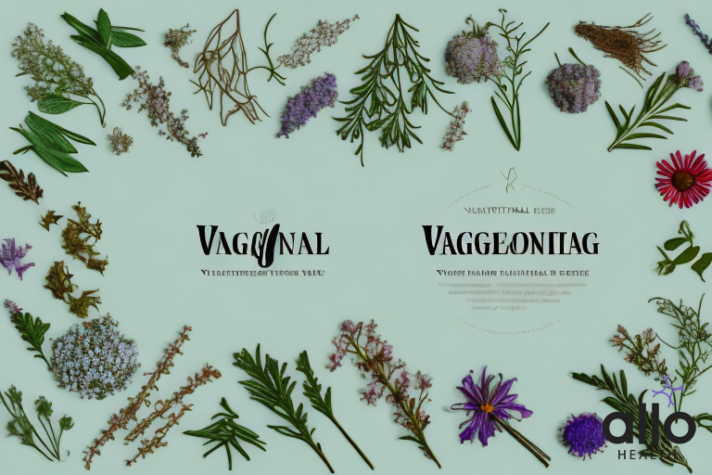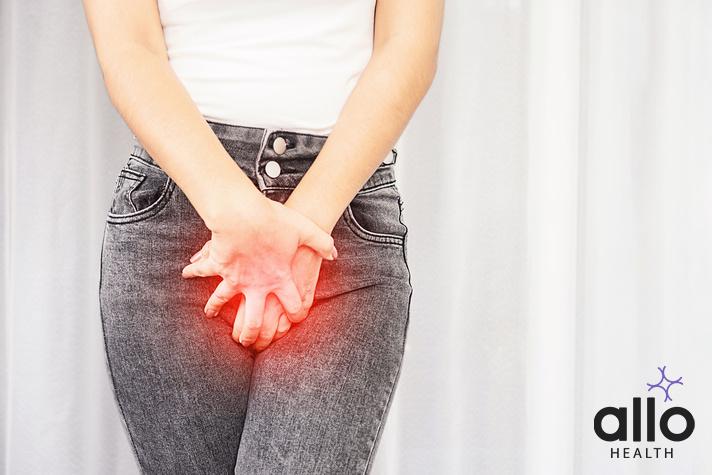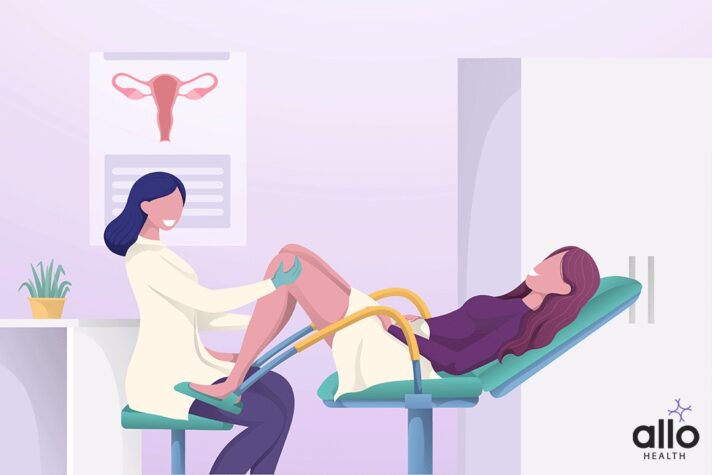7 Home Remedies For Vaginal Bleeding

Allo Health is dedicated to personalized well-being, offering support and trusted information tailored to individual health goals. The platform emphasizes human-generated content, led by a distinguished medical team of experts, including physicians and sexual health specialists. Their commitment to credibility involves rigorous fact-checking, authoritative research, and continuous updates to ensure accurate, up-to-date information. Allo Health's unique approach goes beyond conventional platforms, providing expert-led insights and a continuous commitment to excellence, with user feedback playing a crucial role in shaping the platform's authoritative voice.

Dr.Sushma.V completed MBBS degree from BGS GIMS,bangalore
Why This Was Upated?
Our experts continually monitor the health and wellness space, and we update our articles when new information became available.
Updated on 19 March, 2024
- Article was updated as part of our commitment to diversity, equity, and inclusion.

"The following blog article discusses alternative medicine practices and their potential effects or benefits. However, it is important to note that the information provided is for general educational purposes only and should not be considered as medical advice or a substitute for professional guidance from a qualified healthcare professional. Before considering any alternative medicine practices or treatments, it is recommended to consult with a healthcare professional.
Book consultation
Alternative medicine encompasses a wide range of practices that may not have undergone rigorous scientific evaluation or received widespread acceptance within the medical community. The effectiveness, safety, and appropriateness of alternative medicine practices can vary significantly depending on the individual, their specific medical conditions, and other factors.
It is important to approach alternative medicine practices with caution and skepticism. Some practices may carry potential risks or interact with existing medical treatments. A healthcare professional can provide guidance based on your medical history, evaluate the available evidence, and offer informed advice regarding the potential benefits and risks of alternative medicine practices.
Individuals with specific medical conditions, allergies, or taking medications should exercise particular caution when considering alternative medicine practices. Some practices may have contraindications or adverse effects, and it is essential to discuss these potential concerns with a healthcare professional before pursuing any alternative treatments."
Dealing with vaginal bleeding can be a stressful experience for any woman. There are several causes of vaginal bleeding, ranging from hormonal imbalances to underlying health conditions. Seeking medical attention is always recommended for determining the cause of your bleeding and ensuring the appropriate treatment. But, for those looking for natural ways to ease the symptoms of vaginal bleeding, there are several home remedies available. Here are 7 effective home remedies for vaginal bleeding:
What Is Vaginal Bleeding?
Vaginal bleeding refers to the discharge of blood from the vagina, which is a part of the female reproductive system. It can occur at various stages of a woman’s life and may have different causes. Here’s a more detailed overview:
- Menstrual Bleeding:
- Menstruation: Most commonly, vaginal bleeding occurs as a natural part of the menstrual cycle. Menstrual bleeding is the shedding of the uterine lining, which typically happens every 21 to 35 days in women of reproductive age.
- Abnormal Vaginal Bleeding:
- Irregular Menstrual Cycles: Changes in menstrual patterns, such as irregular or unusually heavy periods, may indicate hormonal imbalances or other underlying health concerns.
- Menorrhagia: This refers to abnormally heavy or prolonged menstrual bleeding that can interfere with a woman’s quality of life.
- Pregnancy-Related Bleeding:
- Implantation Bleeding: Some women experience light bleeding or spotting when a fertilized egg attaches to the lining of the uterus, known as implantation bleeding.
- Miscarriage: Vaginal bleeding can occur during a miscarriage, which is the loss of a pregnancy before 20 weeks.
- Medical Conditions:
- Polycystic Ovary Syndrome (PCOS): Women with PCOS may experience irregular menstrual cycles and abnormal bleeding due to hormonal imbalances.
- Uterine Fibroids: Benign growths in the uterus can lead to heavy or prolonged menstrual bleeding.
- Endometriosis: This condition involves the growth of the uterine lining outside the uterus, causing pain and irregular bleeding.
- Infections and Inflammation:
- Sexually Transmitted Infections (STIs): Infections such as chlamydia or gonorrhea can cause vaginal bleeding and other symptoms.
- Pelvic Inflammatory Disease (PID): An infection of the female reproductive organs can lead to inflammation and bleeding.
- Trauma and Injury:
- Vaginal Trauma: Injuries during childbirth, sexual assault, or other traumatic events can cause vaginal bleeding.
- Hormonal Changes:
- Menopause: The transition to menopause is marked by a decline in reproductive hormones, leading to changes in menstrual patterns and eventually the cessation of periods.
- Cancer:
- Cervical, Uterine, or Ovarian Cancer: Abnormal vaginal bleeding can be a symptom of gynecological cancers.
For any woman experiencing unusual or concerning vaginal bleeding to consult with a healthcare professional. A thorough medical evaluation can help determine the underlying cause and guide appropriate treatment.

Vaginal Bleeding Causes & Symptoms
Causes of Vaginal Bleeding:
- Menstruation:
- Normal Menstrual Cycle: Regular, predictable bleeding that occurs as part of the menstrual cycle.
- Pregnancy-Related Causes:
- Implantation Bleeding: Light bleeding or spotting when a fertilized egg attaches to the uterine lining.
- Miscarriage: Vaginal bleeding can be a sign of pregnancy loss before 20 weeks.
- Ectopic Pregnancy: When a fertilized egg implants outside the uterus, it can lead to vaginal bleeding and abdominal pain.
- Hormonal Imbalances:
- Irregular Menstrual Cycles: Hormonal fluctuations can cause irregular or unpredictable bleeding.
- Menorrhagia: Excessive or prolonged menstrual bleeding due to hormonal imbalances.
- Medical Conditions:
- Uterine Fibroids: Benign tumors in the uterus can cause heavy or prolonged bleeding.
- Polycystic Ovary Syndrome (PCOS): Hormonal imbalances in PCOS can lead to irregular bleeding.
- Endometriosis: The growth of uterine tissue outside the uterus can cause pain and abnormal bleeding.
- Infections and Inflammation:
- Sexually Transmitted Infections (STIs): Infections such as chlamydia or gonorrhea can cause inflammation and bleeding.
- Pelvic Inflammatory Disease (PID): Infection of the female reproductive organs can lead to vaginal bleeding.
- Trauma and Injury:
- Vaginal Trauma: Injury during childbirth, sexual assault, or other trauma can cause bleeding.
- Hormonal Changes:
- Menopause: As hormonal levels decline, changes in menstrual patterns and vaginal bleeding may occur.
- Cancer:
- Gynecological Cancers: Cervical, uterine, or ovarian cancer can cause abnormal vaginal bleeding.
Symptoms of Vaginal Bleeding:
- Amount and Duration:
- Heavy Flow: Experiencing an unusually large amount of blood during menstruation or between periods.
- Prolonged Bleeding: Menstrual cycles lasting longer than usual or continuous spotting.
- Pain and Discomfort:
- Pelvic Pain: Pain in the pelvic region, especially during or after sexual intercourse.
- Abdominal Cramps: Pain similar to menstrual cramps.
- Changes in Menstrual Patterns:
- Irregular Cycles: Inconsistent timing of menstrual periods.
- Absent Periods: Missing periods or not having them as expected.
- Other Symptoms:
- Fever and Chills: Infections may be accompanied by systemic symptoms.
- Nausea and Vomiting: Particularly in cases of ectopic pregnancy or miscarriage.
- Painful Intercourse:
- Dyspareunia: Pain or discomfort during sexual intercourse.
- Systemic Symptoms:
- Fatigue: Feeling tired or weak.
- Weight Loss: Unexplained weight loss may be associated with certain underlying conditions.
It’s crucial for individuals experiencing abnormal vaginal bleeding or associated symptoms to seek medical attention. A healthcare professional can perform a thorough evaluation, including a physical examination, imaging studies, and laboratory tests, to determine the cause and appropriate treatment. Early diagnosis and intervention are essential for managing any underlying conditions.
Vaginal Bleeding Treatments
The treatment for vaginal bleeding depends on the underlying cause. Any unexplained or persistent vaginal bleeding should prompt a visit to a healthcare professional for a proper diagnosis and appropriate treatment. Here’s an overview of potential treatments based on common causes:
Menstrual Irregularities:
- Hormonal Birth Control: Oral contraceptives, hormonal patches, or intrauterine devices (IUDs) can regulate menstrual cycles.
- Hormone Therapy: In some cases, hormone therapy may be prescribed to balance hormonal levels.
Pregnancy-Related Causes:
- Monitoring and Support: In the case of implantation bleeding, monitoring the pregnancy and providing supportive care.
- Medical Management: Depending on the circumstances, medical intervention or surgical procedures may be recommended for ectopic pregnancies or miscarriages.
Hormonal Imbalances:
- Hormone Therapy: Adjustments to hormone levels through medications may be prescribed.
- Lifestyle Changes: Dietary and lifestyle modifications can sometimes help regulate hormonal imbalances.
Medical Conditions:
- Fibroid Management: Treatment options include medication, surgical removal (myomectomy), or, in severe cases, hysterectomy.
- Treatment for PCOS: Managing symptoms through lifestyle changes, medication (e.g., oral contraceptives), and sometimes fertility treatments.
- Surgery for Endometriosis: In severe cases, surgery may be recommended to remove endometrial tissue outside the uterus.
Infections and Inflammation:
- Antibiotics: Treatment for bacterial infections causing vaginal bleeding.
- Anti-inflammatory Medications: To address inflammation.
Trauma and Injury:
- Surgical Repair: In cases of severe trauma or injury, surgical intervention may be necessary.
Hormonal Changes:
- Hormone Replacement Therapy (HRT): For managing symptoms associated with menopause, including vaginal bleeding.
Cancer:
- Surgery: Removal of cancerous tissue, such as in the case of early-stage cervical or uterine cancer.
- Radiation and Chemotherapy: In advanced cases, radiation and chemotherapy may be recommended.
Symptomatic Relief:
- Pain Management: Over-the-counter pain relievers may be recommended for pain associated with bleeding.
- Iron Supplements: If heavy bleeding leads to anemia, iron supplements may be prescribed.
Psychotherapy:
- Emotional Support: For individuals experiencing emotional distress due to conditions such as sexual assault or trauma.
Preventive Measures:
- Regular Check-ups: Routine gynecological examinations for early detection and management of potential concerns.
- Safe Sex Practices: To prevent sexually transmitted infections (STIs) that may cause bleeding.
The specific treatment plan will depend on the individual’s health, the cause of the bleeding, and other factors. It is essential to follow the guidance of healthcare professionals and attend follow-up appointments to monitor progress and address any ongoing concerns.

Vaginal Bleeding Prevention
Preventing vaginal bleeding involves addressing underlying causes and adopting healthy lifestyle practices. Here are some detailed preventive measures:
Regular Gynecological Check-ups:
- Annual Exams: Regular visits to a healthcare provider for routine gynecological examinations can help detect and address potential concerns early.
Safe Sex Practices:
- Condom Use: Consistent and correct use of condoms can reduce the risk of sexually transmitted infections (STIs) that may cause vaginal bleeding.
Hormonal Birth Control:
- Contraception: Use of hormonal birth control methods, such as oral contraceptives or intrauterine devices (IUDs), can help regulate menstrual cycles and reduce the risk of irregular bleeding.
Healthy Lifestyle:
- Balanced Diet: Maintain a diet rich in fruits, vegetables, whole grains, and lean proteins to support overall health and hormonal balance.
- Regular Exercise: Engage in regular physical activity to promote a healthy weight and regulate menstrual cycles.
Manage Stress:
- Stress Reduction Techniques: Practice stress management techniques such as meditation, yoga, or deep breathing exercises to help maintain hormonal balance.
Prompt Treatment of Infections:
- Safe Sexual Practices: Use barrier methods (condoms) to reduce the risk of STIs.
- Regular Testing: For individuals at risk, regular testing and prompt treatment of STIs can help prevent complications leading to vaginal bleeding.
Maintain a Healthy Weight:
- Balanced Weight: Maintaining a healthy weight through proper diet and exercise can help regulate menstrual cycles.
Regular Monitoring During Pregnancy:
- Prenatal Care: Attend regular prenatal check-ups and follow medical advice during pregnancy to monitor and address potential complications.
Avoid Smoking and Excessive Alcohol:
- Quit Smoking: Smoking can negatively impact reproductive health. Quitting smoking can improve overall health.
- Limit Alcohol Intake: Excessive alcohol consumption can disrupt hormonal balance; moderation is key.
Adopting Healthy Sexual Practices:
- Consent and Communication: Ensure that sexual activity is consensual, and open communication with partners can help prevent trauma or injury.
Awareness of Family History:
- Know Family Medical History: Understanding the family medical history can help in identifying potential genetic factors that may contribute to reproductive health concerns.
Addressing Hormonal Imbalances:
- Medical Guidance: If hormonal imbalances are identified, follow medical advice regarding appropriate treatments and lifestyle adjustments.
Educational Programs:
- Health Education: Participate in educational programs or counseling sessions that provide information on reproductive health and menstrual hygiene.
Self-Examination:
- Breast and Pelvic Self-Exams: Regular self-examinations can help detect abnormalities early.
Prevention involves a combination of healthy lifestyle choices, prompt medical attention, and awareness of one’s reproductive health. It’s crucial to consult with healthcare professionals for personalized advice and to address any concerns related to vaginal bleeding or reproductive health.
7 Home Remedies For Vaginal Bleeding
It’s essential to note that home remedies are not a substitute for professional medical advice and treatment, especially when dealing with vaginal bleeding. If you are experiencing abnormal or persistent vaginal bleeding, it’s crucial to consult with a healthcare professional for a proper diagnosis and appropriate treatment. That being said, here are some general home care measures that may help alleviate discomfort associated with mild vaginal bleeding or menstrual symptoms:
Rest and Hydration:
- Description: Ensure you get adequate rest and stay well-hydrated.
- Rationale: Rest allows the body to recover, and proper hydration is essential for overall health.
Warm Compress:
- Description: Apply a warm compress or heating pad to the lower abdomen.
- Rationale: Heat can help relax the pelvic muscles and alleviate menstrual cramps.
Hygiene Practices:
- Description: Maintain good hygiene by using gentle, unscented soaps and avoiding harsh products in the genital area.
- Rationale: Proper hygiene can help prevent irritation and infection.
Herbal Teas:
- Description: Drink herbal teas such as chamomile or ginger tea.
- Rationale: Some herbs have anti-inflammatory properties and may help alleviate menstrual discomfort.
Dietary Changes:
- Description: Consume a diet rich in fruits, vegetables, and whole grains while limiting processed foods.
- Rationale: A balanced diet supports overall health and may help regulate hormonal balance.
Exercise:
- Description: Engage in gentle exercises, such as walking or yoga.
- Rationale: Regular physical activity can help alleviate menstrual cramps and improve overall well-being.
Adequate Iron Intake:
- Description: Include iron-rich foods in your diet, such as spinach, lentils, and lean meats.
- Rationale: Adequate iron intake is important, especially for those experiencing heavy menstrual bleeding to prevent or manage anemia.
Important Notes:
- Consultation with a Healthcare Professional: It’s crucial to consult with a healthcare professional to determine the cause of vaginal bleeding and to receive appropriate medical guidance.
- Caution with Herbal Remedies: While herbal teas are generally safe, it’s essential to be cautious with herbal supplements, as they can interact with medications or have unintended effects. Consult with a healthcare provider before trying herbal remedies.
- Avoiding Certain Practices: Avoid using tampons or engaging in sexual intercourse during episodes of unexplained or abnormal vaginal bleeding.
- Monitoring Symptoms: Keep track of your symptoms, and if there is any worsening or persistence of symptoms, seek prompt medical attention.
Remember, these home remedies are not a substitute for professional medical care, and it’s crucial to consult with a healthcare provider for a proper diagnosis and appropriate treatment.
Precautions For Home Remedies For Vaginal Bleeding
When considering home remedies for vaginal bleeding, it’s crucial to exercise caution and prioritize your health and well-being. While some remedies may provide relief, it’s important to be mindful of potential risks and complications. Here are detailed precautions to consider:
Consult with a Healthcare Professional:
- Precaution: Before attempting any home remedy, consult with a healthcare professional, especially if you’re unsure about the cause of vaginal bleeding or if it persists.
- Rationale: Professional guidance ensures you receive appropriate care and that the chosen remedy is suitable for your specific situation.
Be Aware of Underlying Causes:
- Precaution: Understand that home remedies address symptoms but may not treat the underlying cause of vaginal bleeding.
- Rationale: Identifying and addressing the root cause is essential for effective and lasting management. Unexplained or persistent bleeding requires medical evaluation.
Avoid Herbal Remedies Without Guidance:
- Precaution: Exercise caution with herbal remedies, as they may interact with medications or have unintended effects.
- Rationale: Some herbs can affect blood clotting or hormonal balance, so it’s essential to consult with a healthcare provider before using herbal supplements.
Monitor for Worsening Symptoms:
- Precaution: Keep a close eye on your symptoms, and if there is any worsening or persistence of bleeding, seek prompt medical attention.
- Rationale: Home remedies may not be sufficient for more severe conditions, and delaying professional care can lead to complications.
Avoid Certain Practices:
- Precaution: Refrain from using tampons or engaging in sexual intercourse during episodes of unexplained or abnormal vaginal bleeding.
- Rationale: These practices can exacerbate existing concerns or introduce foreign substances, potentially leading to complications.
Consider Individual Health Factors:
- Precaution: Take into account individual health conditions, allergies, or sensitivities when considering home remedies.
- Rationale: Certain remedies may not be suitable for everyone, and a tailored approach is necessary to ensure safety and efficacy.
Seek Professional Advice for Severe Symptoms:
- Precaution: If symptoms are severe, including heavy bleeding, intense pain, or signs of infection, seek immediate medical attention.
- Rationale: Severe symptoms may require urgent intervention, and professional assessment is crucial to determine the appropriate course of action.
Important Note:
These precautions are general guidelines, and individual circumstances may vary. Always consult with a healthcare professional for personalized advice and guidance based on your specific health situation. If you are unsure about the cause of vaginal bleeding or if it is persistent, seeking professional medical attention is paramount.
Most Asked Questions
-
Can home remedies effectively stop vaginal bleeding?
Home remedies may help alleviate mild vaginal bleeding symptoms, but they are not a substitute for professional medical advice. if you experience abnormal or persistent bleeding, consult a healthcare professional for a proper diagnosis and appropriate treatment.
-
Are herbal teas a reliable solution for managing vaginal bleeding?
while herbal teas like chamomile or ginger may have anti-inflammatory properties and could help ease menstrual discomfort, they are not a guaranteed solution for stopping or managing vaginal bleeding. it's essential to consult with a healthcare provider for personalized advice.
-
Can a warm compress effectively reduce menstrual cramps and bleeding?
Applying a warm compress or heating pad to the lower abdomen can provide relief from menstrual cramps but may not directly stop vaginal bleeding. for persistent or severe bleeding, seek professional medical guidance.
-
Is exercise a practical home remedy for controlling vaginal bleeding?
Gentle exercises such as walking or yoga may help alleviate menstrual cramps and improve overall well-being, but they are not a direct solution for stopping vaginal bleeding. consult with a healthcare professional for personalized advice.
-
Can dietary changes impact and regulate vaginal bleeding?
A balanced diet rich in fruits, vegetables, and whole grains supports overall health and hormonal balance, potentially aiding in the regulation of menstrual cycles. But, it's crucial to consult with a healthcare provider for a comprehensive approach to managing vaginal bleeding.





































